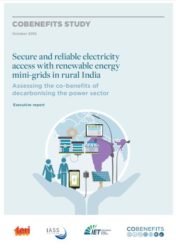 Energy access is essential for economic and human development and is an important driver for the progress of India. Access to modern forms of energy becomes even more important for the socio-economic development of rural areas. To achieve “full electrification” successive Indian governments have focussed on providing access by extending the centralised grid. Although a considerable number of villages and households have gained access to the grid, the reliability and quality of power supply still remain a growing challenge for rural consumers. Mini-grids have thus emerged as pivotal in providing ancillary services to the grid and improving the level of services to last-mile consumers. This study assesses the viability of renewable-energy powered mini-grids to both drive and support economic growth in India from the perspective of augmenting the current electrification of rural areas. The study aims to assess the range of additional benefits resulting from a low-carbon energy transition in India.
Energy access is essential for economic and human development and is an important driver for the progress of India. Access to modern forms of energy becomes even more important for the socio-economic development of rural areas. To achieve “full electrification” successive Indian governments have focussed on providing access by extending the centralised grid. Although a considerable number of villages and households have gained access to the grid, the reliability and quality of power supply still remain a growing challenge for rural consumers. Mini-grids have thus emerged as pivotal in providing ancillary services to the grid and improving the level of services to last-mile consumers. This study assesses the viability of renewable-energy powered mini-grids to both drive and support economic growth in India from the perspective of augmenting the current electrification of rural areas. The study aims to assess the range of additional benefits resulting from a low-carbon energy transition in India.
Download:
Key policy opportunities:
Policy opportunity 1: Solar-powered mini-grids of high installed power capacity can remain economically viable and cost-competitive with the centralised grid in rural areas of India. Solar mini-grid systems greater than 100 kW with interest rates as low as 8 % and a 15 % return on equity can achieve grid parity and a low cost of electricity supply to the rural consumer.
Policy opportunity 2: Solar mini-grids are effective for improving rural education in India, as most schools in remote areas of India experience continuous power cuts which impede the quality of education that the students receive. Mini-grids can provide electricity at schools or education centres consistently during the teaching hours to help stimulate better educational outcomes for the students in rural India.
Policy opportunity 3: To drive the growth of higher power capacity mini-grids that are essential for reliable 24/7 rural electrification, mechanisms are needed to be developed to make it suitable for the mini-grid developer to transfer the system’s assets to the state-owned utility when the central grid arrives at the area served by the mini-grid. This mechanism must be developed in collaboration with the private sector.
Year of publication: 2019
Editors: Ayodeji Okunlola, David Jacobs, Laura Nagel, Sebastian Helgenberger, Arunima Hakhu
and Sarah Kovac – IASS, IET, TERI and UfU
Technical implementation: Bigsna Gill and Rashmi Murali – The Energy and Resources Institute
(TERI), India
Suggested citation: IASS/TERI. Secure and reliable electricity access with renewable energy mini-grids in rural India. Assessing the co-benefits of decarbonising the power sector. Potsdam/New Delhi: IASS/TERI, 2019.
DOI: 10.2312/iass.2019/020
This study is part of a 2019 series of three studies assessing the co-benefits of decarbonising the power sector in India, edited by IASS, IET, TERI and UfU:
